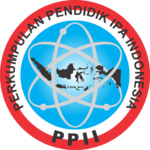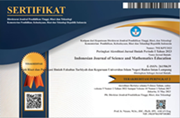An analysis of Technological, Pedagogical, and Content Knowledge (TPACK) competencies of mathematics teachers in Sumatra in terms of gender
Abstract
This research aims to analyze the TPACK competencies of mathematics teachers in Sumatra based on gender differences. Using a sequential explanatory mixed method approach, this study collected data through questionnaires and interviews to test hypotheses using two-way analysis of variance (ANOVA). The results indicate that mathematics teachers in Sumatra have a high level of TPACK competencies, with gender influencing the pedagogical knowledge and content knowledge domains. Specifically, male teachers exhibit higher competency in these domains compared to their female counterparts. Additionally, male teachers more frequently utilize technology in teaching and exhibit greater variability in integrating TPACK compared to female teachers. The implication of this research provides valuable insights for the development of teacher training programs that consider gender factors in enhancing TPACK competency, which is crucial for effective technology integration in mathematics education.
Keywords
Full Text:
PDFReferences
N. Rafi, I., & Sabrina, “Pengintegrasian TPACK dalam Pembelajaran transformasi geometri sma untuk mengembangkan profesionalitas guru matematika,” SJME (Supremum Journal of Mathematics Education), vol. 3, no. 1, pp. 47-56, 2019.
J. Sepriyanti, N., Nelwati, S., Kustati, M., & Afriadi, “The effect of 21st-century learning on higher-order thinking skills (HOTS) and numerical literacy of education and science students in indonesia in the term of gender,” J. Pendidik. IPA Indones., vol. 11, no. 2., pp. 314-321, 2022.
Ariani, D.N., “Hubungan antara technological pedagocical content knowledge dengan technology integration self efficacy guru matematika di sekolah dasar,” J. Madrasah Ibtidaiyah, vol. 1, no. 1, pp. 79–91, 2015.
Santos, M.J and Castro, D.R.R., “Technological pedagogical content knowledge (TPACK) in action: Application of learning in the classroom by pre- service teachers (PST),” Soc. Sci. Humanit. Open, vol. 3, no. 1, pp. 1-8, 2021.
E. A. Afriansyah, “Problem Posing sebagai kemampuan matematis,” Jurnal Mosharafa, vol. 6, no. 1, pp. 163-179, 2017.
D. T. Tarusu, “Kemampuan pedagogik matematika SD pada PGSD FIP UNIMA” Mosharafa J. Math. Educ., vol. 7, no. 2, pp. 264-272, 2018.
Crossley, S.A., & Mc Namara, S.D., Adaptive educational technologies for literacy instruction. Inggris : Routledge, 2017.
W. A. W. Ghavifekr, S., & Rosdy, “Teaching and learning with technology: Effectiveness of ICT integration in schools,” Int. J. Res. Educ. Sci., vol. 1, no. 2, pp. 175–191, 2015.
S. Rasilah, Dahlan, J. A., & Sudirman, “Technological pedagogical and content knowledge untuk guru matematika di era digital : Literature review,” Gema Wiralodra, vol. 12, no. 1, pp. 84–93, 2021.
L. Sukardjo, M., & Sugiyanta, “Korelasi hasil UKG SMA tahun 2015 dengan hasil UN Matematika SMA tahun 2016 Daerah Istimewa Yogyakarta,” JTP – J. Teknologi Pendidikan, vol. 20, no. 1, pp. 60–72, 2018.
W. N. . Sayekti, “Kontribusi uji kompetensi guru, motivasi berprestasi, dan pengalaman mengajar terhadap kompetensi profesional guru,” J. Media Manajemen Pendidikan, vol. 1, no. 3, pp. 123–130, 2019.
M. Tohir, “Hasil PISA Indonesia tahun 2018 turun dibanding tahun 2019,” Wordpress, 2019. [Online]. Available : https://matematohir.wordpress.com/2019/12/03/hasil-pisa-indonesia-tahun-2018-turun-dibanding-tahun-2015/ (Acessed Jan. 21, 2024).
S. Suyamto, J., Masykuri, M., & Sarwanto, “Analisis TPACK (Technolgical, Pedagogical, and Content, Knowledge) guru biologi SMA dalam menyusun perangkat pembelajaran materi sistem peredaran darah,” INKUIRI :Jurnal Pendidikan IPA, vol. 9, no. 1, pp. 44-53, 2020, doi : https://doi.org/10.20961/inkuiri.v9i1.41381
C. Ismail, I. Sahin and Akturk, O.A., “Analysis of the relations among the components of technological pedagogical and content knowledge (TPACK): A structural equation model,” J. Educ. Comput. Res., vol. 51, no 1, pp. 1–22, 2014, doi: 10.2190/EC.51.1.a.
Tondeur, J., Scherer, R., and Siddiq, “Enhancing pre-service teachers’ technological pedagogical content knowledge (TPACK): A mixed- method study,” Educ. Technol. Res. Dev., vol. 68, no. 1, pp. 319-343, 2020, doi: 10.1007/s11423-019-09692-1.
S. Pamuk, “Understanding preservice teachers’ technology use through TPACK framework,” Journal of Computer Assisted Learning, vol. 28, no. 5, pp. 425–439, 2012, doi: 10.1111/j.1365-2729.2011.00447.x.
B. Evrim and E. Uygun, “Putting technological, pedagogical, and content knowledge (TPACK) in action: An integrated TPACK-Design-(DBL) approach based learning,” Australas. J. Educ. Technol., vol. 32, no. 2, pp. 47–63, 2016, doi: 10.14742/ajet.2551.
C.-C. Chai, C. S., Koh, J. H. L., and Tsai, “Exploring the factor structure of the constructs of Technological, Pedagogical, Content Knowledge (TPACK),” Asia-Pacific Educ. Res., vol. 20, no. 3, pp. 103-115, 2011, doi: 10.1111/j.1365-2729.2012.00487.x.
J. van B. Voogt, J., P. Fisser, N. Pareja Roblin, and J. Tondeur, “Technological pedagogical content knowledge-a review of the literature,” J. Comput. Assist. Learn., vol. 29, no. 2, pp. 1-13, 2013, doi: 10.1111/j.1365-2729.2012.00487.x.
A. S. Jimoyiannis, P. Tsiotakis, D. Roussinos, and A. Siorenta “Preparing teachers to integrate web 2.0 in school practice: Toward a framework for pedagogy 2.0,” Australas. J. Educ. Technol., vol. 29, no. 2, pp. 248-267, 2013, doi: 10.14742/ajet.157.
N. Srisawasdi, “The role of TPACK in physics classroom: Case studies of preservice physics teachers,” in Procedia-Social and Behavioral Sciences, vol. 46, no. 2, pp. 3235-3243, 2012. doi: 10.1016/j.sbspro.2012.06.043.
M. Masrifah, A. Setiawan, P. Sinaga, and W. Setiawan, “Profile of senior hight school in service physics teachers technological pedagogical and content knowledge (TPACK),” J. Phys. Conf. Ser., 2018, pp. 1-6, doi : 10.1088/1742-6596/1097/1/012025
Y. Choi and S.-H. Hong, “Effect of a science-based TPACK program for elementary preservice teachers according to their gender,” Contemporary Issues in Technology and Teacher Education, vol. 22, no. 3, pp. 542–578, 2022.
M. F. Jang, S. J., and Tsai, “Exploring the TPACK of taiwanese secondary school science teachers using a new contextualized TPACK model,” Australas. J. Educ. Technol., vol. 29, no. 4, pp. 566–580, 2013.
M. H. Lin, T. C., Tsai, C. C., Chai, C. S., and Lee, “Identifying science teachers’ perceptions of technological pedagogical and content knowledge (TPACK),” J. Sci. Educ. Technol., vol. 22, no. 3, pp. 325–336, 2013.
C. C. Koh, J. H. L., Chai, C. S., and Tsai, “Examining the technological pedagogical content knowledge of Singapore pre-service teachers with a large-scale survey,” J. Comput. Assist. Learn., vol. 26, no. 6, pp. 563–573, 2010.
C. . Ersanli, “Improving technological pedagogical content knowledge (TPACK) of pre-service english language teachers,” Int. Educ. Stud., vol. 9, no. 5, pp. 18–27, 2016.
S.-J. Jang and M.-F. Tsai, “Exploring the TPACK of Taiwanese secondary school science teachers using a new contextualized TPACK model,” Australasian Journal of Educational Technology, vol. 29, no. 4, Art. no. 4, pp. 566-580, 2013, doi: 10.14742/ajet.282.
A. Akhwani and D. W. Rahayu, “Analisis komponen TPACK guru SD sebagai kerangka kompetensi guru profesional di Abad 21,” J. basicedu, vol. 5, no. 4, pp. 1918–1925, 2021.
N. Hidayati, P. Setyosari, and Y. Soepriyanto, “Kompetensi technological pedagogical content knowledge (TPACK) guru soshum setingkat SMA,” J. Kaji. Teknol. Pendidik., vol. 1, no. 4, pp. 291–298, 2019.
B. Yurinda and N. Widyasari, “Analisis technological pedagogical content knowledge (TPACK) guru profesional dalam pembelajaran matematika di sekolah dasar,” Fibonacci : J. Pendidik. Mat. Dan Mat., vol. 8, no. 1, pp. 47–60, 2022.
R. Akdon, Formulas and Data in Statistical Applications. Bandung: Alfabeta, 2007.
E. Innaha, R., and Setyaningsih, “Kemampuan techonological content knowledge (TPK) guru IPA di sekolah inkulis SMPN 23 Surakarta tahun ajaran 2017-2018,” in National Seminar on Biology and Science Education III, May 5, 2018.
Doering, “Using the technological pedagogical and content knowledge framework to design online learning environment and professional development,” J. Educ. Comput. Res., vol. 41, no. 3, pp. 319–34, 2009.
N. Adrianus, and D.H. Maimunah, “Analisis Kemampuan Guru IPA tentang Technological Pedagogical Content Knowledge pada SMP/MTs di Kota ENde,” J. Pendidikan Fisika, vol. 4, no. 1, pp. 9–20, 2020, doi : https://doi.org/10.37478/optika.v4i1.413.
Y.-J. Hsu, L., and Chen, “Teachers’ knowledge and competence in the digital age: descriptive research within the TPACK framework,” Int. J. Inf. Educ. Technol., vol. 8, no. 6, pp. 455–458, 2018.
J. J. Syh and T.F. Meng “Exploring the TPACK of Taiwanese elementary mathematics and science teachers with respect to the use of interactive whiteboards,” Comput. Educ., vol. 59(2), pp. 327–338, 2012, doi: https://doi.org/10.1016/j.compedu.2012.02.003.
R. Wahida, D., Sepriyanti, N., and Fitriza, “Analysis the technological pedagogical and content knowledge capabilities of Junior High School/MTS mathematics educators in south solok regency,” in Proceedings of Imam Bonjol International Conference on Islamic Education, Padang, Indonesia, Sept. 14-15, 2023.
A. Aini, F. Q., Sepriyanti, N., and Susanto, “The use of LKPD bases on the TPACK framework on the mathematical problem solving ability of class X MAN 4 Agam students,” J. Prinsip Pendidik. Mat., vol. 5, no. 1, pp. 74–80, 2022.
DOI: http://dx.doi.org/10.24042/ijsme.v7i1.20432
Refbacks
- There are currently no refbacks.
Copyright (c) 2024 Unit Riset dan Publikasi Ilmiah FTK UIN Raden Intan Lampung

This work is licensed under a Creative Commons Attribution-ShareAlike 4.0 International License.

Indonesian Journal of Science and Mathematics Education is licensed under a Creative Commons Attribution-ShareAlike 4.0 International License.




